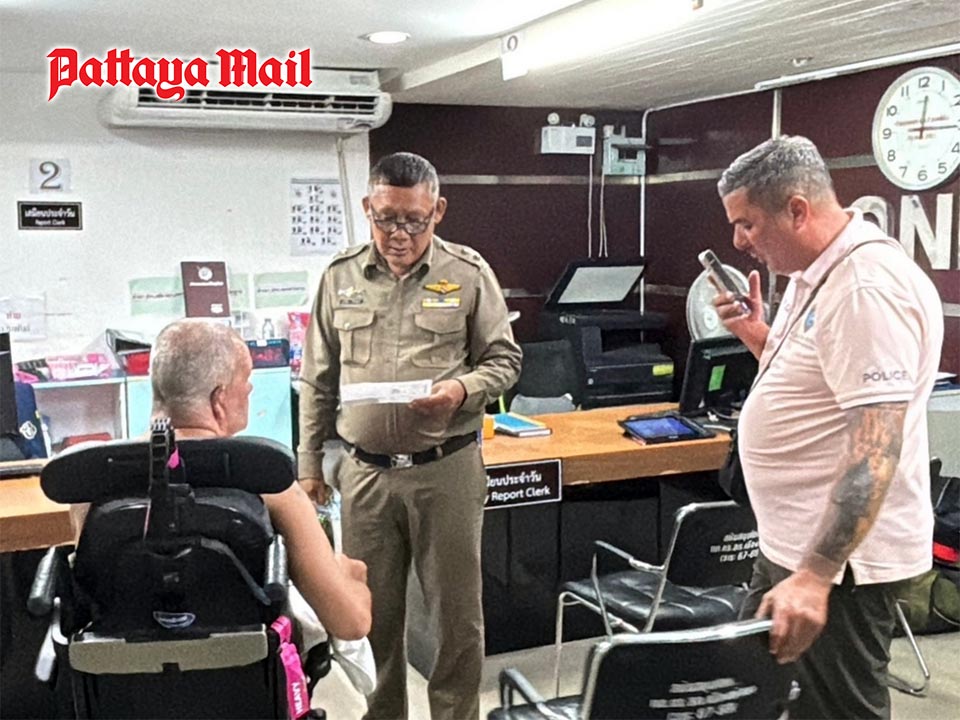British visitor robbed after seeking comfort at Pattaya Beach, public upset by ongoing unsolved theft cases
Disabled foreign tourist robbed after trusting local companions at Pattaya beachside; victim reports theft promptly as police launch investigation using hotel CCTV and suspect IDs.
PATTAYA, Thailand – A disturbing incident has shaken Pattaya’s reputation as a welcoming destination for travelers, as a disabled foreign tourist was reportedly robbed after seeking companionship at a beachside location shortly after midnight on July 16. The man, unable to speak and reliant on a wheelchair, engaged the company of two Thai women and one transgender companion at the beach. After returning to his hotel room hoping to ease his loneliness, he went to take a shower. When he came out expecting to enjoy the moment, he found all three had left the room. Upon checking, he discovered that 6,000 baht and 150 pounds (approximately 6,500 baht) were missing. The victim promptly reported the theft to the police.
Local police quickly recorded the complaint and launched an investigation, using CCTV footage and identification left by the suspects at the hotel to track down the perpetrators. Authorities have promised to pursue the case vigorously.
Adding to public alarm, a recent incident on July 15 involved an American tourist who was attacked and robbed of 3,000 baht during an early-morning stroll along Soi Pattaya Beach 6/1 by two provocatively dressed transgender individuals who had offered companionship. The tourist also suffered a head wound in the assault, underscoring growing concerns about safety for visitors in popular nightlife and beachfront areas.
The incidents have sparked a wave of raw, heartfelt responses from Pattaya residents. One commenter lamented the lack of kindness and mercy in the city, noting rampant theft and exploitation. This person demanded public shaming of thieves as a deterrent to crime. Another expressed sorrow over the complete lack of empathy shown by the perpetrators who targeted a disabled visitor, pleading with police to swiftly apprehend the criminals and return the stolen money. “He came all the way here to enjoy his trip—show some mercy to the disabled,” they wrote, urging the wrongdoers either to leave Pattaya’s beaches or, better yet, be put in jail.
Two Thai women and one transgender companion vanish with nearly 13,000 baht in cash, sparking community outrage and calls for stronger law enforcement to protect vulnerable visitors.
Other locals voiced faith in karmic justice, confident the perpetrators will soon face consequences for their actions. Yet many also expressed frustration over longstanding illegal activities and unauthorized businesses that have persisted for decades, undermining Pattaya’s image as a safe, tourist-friendly city. Comments noted how such opportunistic acts betray visitors’ trust and harm the entire community’s reputation.
A growing number of news readers have begun to notice a troubling pattern — the same patrol and investigative officers frequently appearing in similar incident reports, often handling nearly identical theft cases involving tourists in the same beachfront areas and nightlife zones. Rather than blaming the police, many in the public have expressed sympathy for the frontline officers, who are clearly overwhelmed by the sheer volume of cases and the repeat nature of these crimes. There is growing recognition that the issue may lie not in effort, but in capacity — with too few detectives stretched across too many incidents — and in the limitations of the legal system itself.
Even when suspects are caught, vague and weak laws often result in only minor penalties, failing to deter repeat offenders or dismantle larger criminal networks. This has led to renewed calls for stronger legal tools, better inter-agency coordination, and more resources to support overburdened officers. Locals agree that without a tougher and clearer legal framework, even the most dedicated efforts may fall short. To truly restore Pattaya’s image as a safe and welcoming destination, sustained crackdowns must be matched with serious reforms.



